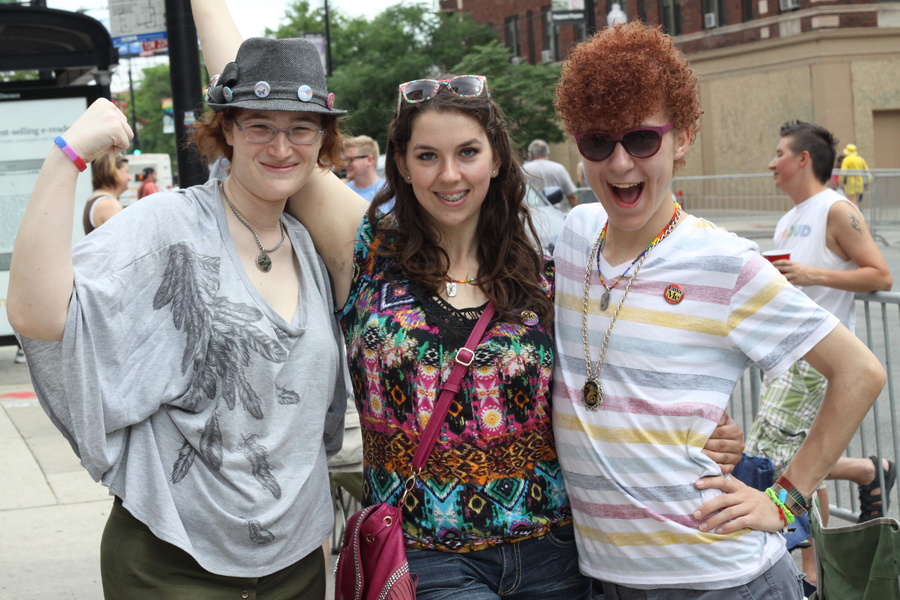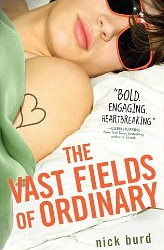Raciel, 19, Brooklyn, NY
I wasn’t scared to move to New York. I’d been sneaking away to the city since I was 11. My friends and I would skip school and ask people how to get to the Village. My dad wasn’t a parent who was overprotective. I never gave my parents reason to disbelieve me.
I’ve been happy since moving to New York. Not as happy as I was in the beginning, but that was during the summertime when everything was great.
I was on the beach last summer, and guys would just hit on me. It was a lot easier for me to meet people in New York. It was on the beach that I met a 42-year-old guy who was a social worker at NYU. We only dated for two months, but I really got to know him. I really fell in love with him. It was so cosmic, I guess. It was one of the greatest times of my life.
But I had to get rid of him. He didn’t know what he wanted. It was so unstable. One minute he didn’t want me, and the next minute he did.
I couldn’t possibly date someone my age. Even if they’re only a year older, they’ve always been older. I tried to date younger guys and it did not work out. Kids my age usually jump into relationships, which I think is reckless.
But my mind is so stuck on school and work now, I don’t want to date. I was always the kind of person who needed to be with someone, but I want to party and be free. A boy would take too much away.
I’m smart and very creative, but academically I have my moments. I dropped out of high school in ninth grade.
The biggest problem was my mother’s instability. She had a boyfriend and it was all about him. We were constantly arguing. I was going to move in with my dad, but then he called me up and said, “I don’t want your gayness in my house.” So I got in contact with my aunt and uncle in Pennsylvania. If I had my own car I’d probably still be there, but I don’t like depending on people.
So I told my dad I couldn’t stay with my aunt and uncle and he said, “You are my son and you are coming to stay with me.” When he said I could stay with him in Newark, New Jersey, I couldn’t believe it. But I didn’t find myself going anywhere there. That’s where my homelessness started. I could go home if I told my parents I was done with this struggling, but then I would be at step one. I didn’t come this far to go back now.
I was never on-the-street homeless. I did my research. I wasn’t going to stay at a regular men’s shelter. It’s very dangerous. I stayed at the Covenant House for 40 days. That’s when a bed opened up at Ali Forney. There are only so many beds. There are 4,000 homeless kids who identify as LGBT. If you don’t know about the services, you’re out of luck.
I got my GED at Hetrick Martin Institute. My teachers helped me out so much. I totally felt comfortable being around so many gay kids, and it helped me accept myself even more. I never say that out loud, but it’s true. Growing up with my parents throwing it in my face all the time, it was really hard for me to accept being gay.
But since moving to New York, I act how I want to act. I have an internship in PR and am going to school at Kingsborough Community College. I’m so proud of myself. I’m kind of surviving. It’s not New York City unless you struggle.
As told to Diana Scholl.
Photo by Laurel Golio, taken in Brooklyn, NY, 2011
To tell your story, email hello@wearetheyouth.org
Is This Heaven? It’s Iowa
We didn’t know this before last week, but apparently Nebraska and Iowa have a bit of a rivalry. So while our new Nebraska friends had us a bit biased as to what we’d find in the Hawkeye State, we have been impressed!
After a breakfast with Eric in downtown Omaha, we hit the road to Newton, Iowa, where Dana at the Iowa Pride Network, a group that helps students in the state strengthen their gay-straight alliances, connected us with Sam and Ella. Newton Senior High School Gay-Straight Alliance, of which Ella is the president, won the award last year for best GSA in the state!
We heard their amazing stories, and after our interview, they took us on a tour of a town, and we went with them and a friend to Panda Garden, a chinese buffet. Sam had to leave for a band performance, but Ella, a member of the school bowling team, put on her bowling uniform to pose for some photos at the bowling alley that you are going to love. Then we played a game of bowling ourselves. We were not high school bowling team caliber, but had fun.
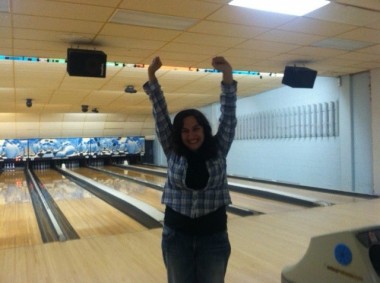
Then we headed to Ottumwa, a town about an hour south of Newton. In the morning we woke up earlier than we are use to to photograph KiRel before he started school. He was really great and friendly, and we wished we had more time to spend with him.
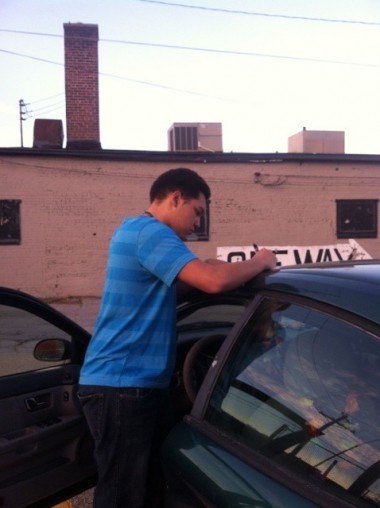
After the hills of Iowa made us glad we love women, and after a quick stop for lunch at Myers Grill & Catering (a great Yelp find), we were off to Iowa City.
In Iowa City, we met with a fantastic group of high school students at United Action for Youth, profiled Jacob, Natasha, and Alex, and had a chance to talk to the great staff at UAY. Thanks Joe for inviting us!
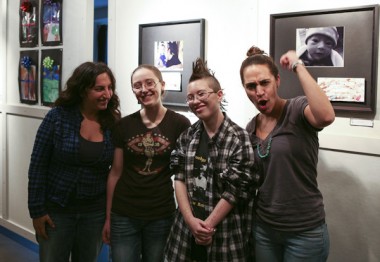
Then after delicious sushi, we went to the Student Union to watch the Presidential Debate, where LGBT rights were absent from the debate again. But at least we got these great t-shirts.
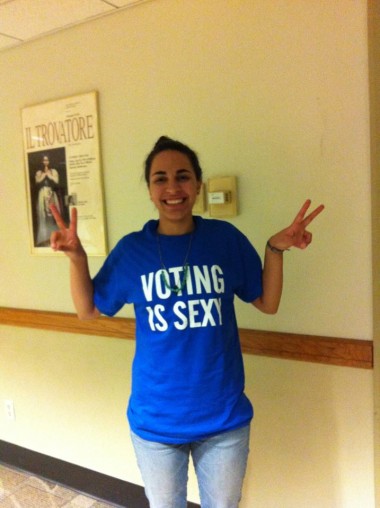
Tomorrow is a driving day. We’ll blog again in Minnesota!
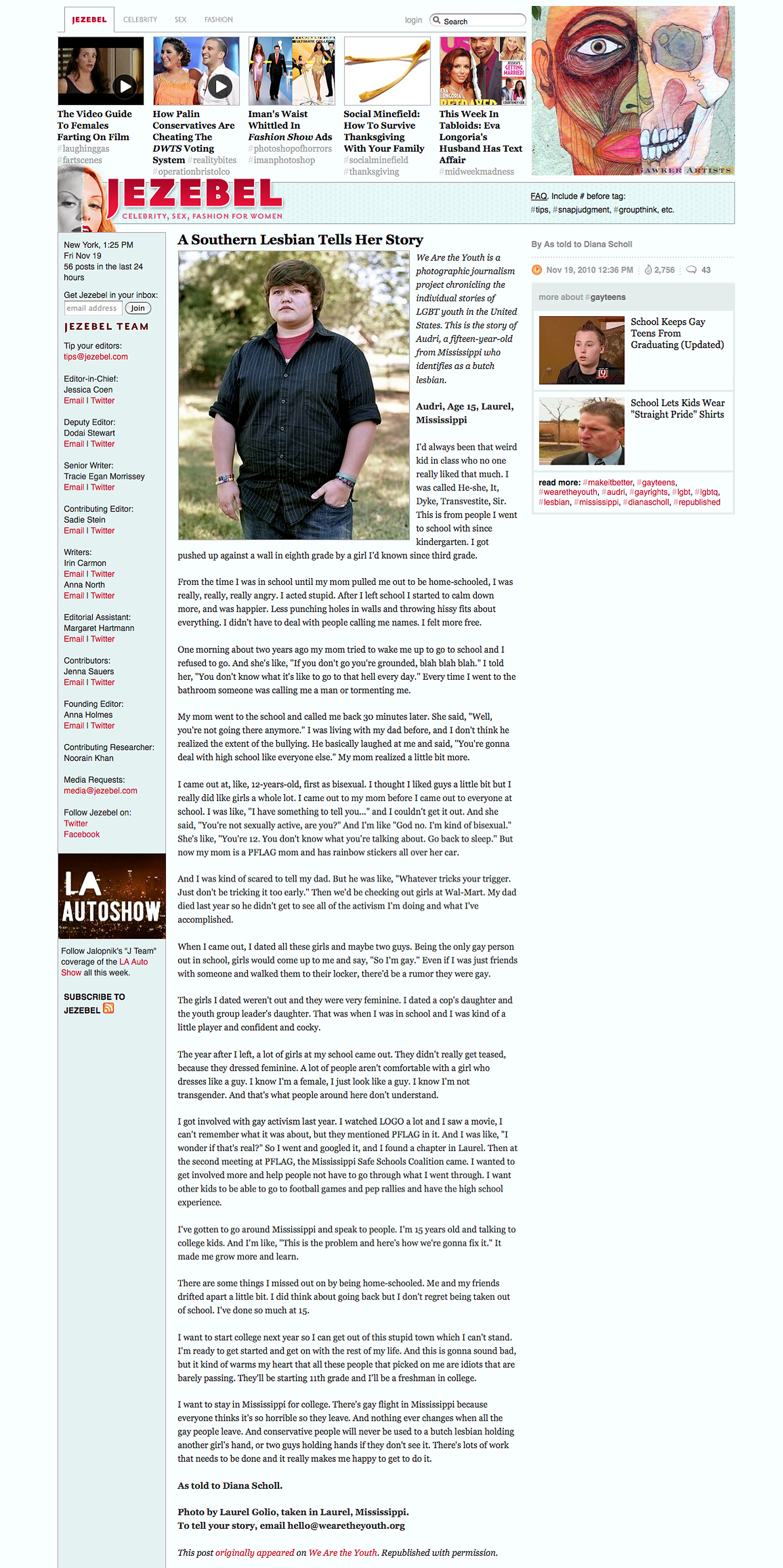
Jezebel, November 2010
Read the Original Story
Alex Reports on Chicago Pride
Alex, (a Chicago-based writer and We Are the Youth guest blogger), attended Chicago Pride on June 24, 2012. Friend Alex on Facebook & Follow Alex on Twitter

With a record attendance of 850,000 people, a new and improved parade route, and a later start time, this year’s Chicago Pride Parade was a time for exploration and improvement. For the participants, this translated into having enough room to walk safely alongside the parade route and a more comfortable parade watching experience.
From me, this was my third Pride in Chicago, and I was marching near the beginning of the parade with Pride of Links, a youth group for queer teens in the Northern suburbs of Chicago run by a wonderful woman named Erchell.
I arrived early and spent a few hours talking to people, taking photos, and soaking up the wonderful Pride atmosphere. (more…)
Alex Reports Back on White House Reception
Alex, (a Chicago-based writer and We Are the Youth guest blogger), attended the LGBTQ Pride Month Reception at the White House. Friend Alex on Facebook & Follow Alex on Twitter
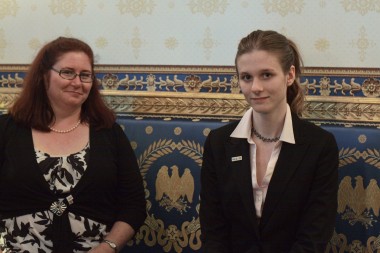
My name is Alex Sennello, and I’m from the Chicago area. That’s my mother and I on a couch in the White House with the presidential seal.
I was there last week for President Obama’s LGBTQ Pride Month Reception for my work with GLSEN, the Gay Lesbian Straight Education Network, at the 2012 Safe Schools Advocacy Summit. While at the summit in Washington, often referred to as SASS by its attendees, I learned skills that I can use to be a political advocate for safe schools legislation like the Safe Schools Improvement Act, a bill that would work to address bullying from the federal level, or the Student Non Discrimination Act, which seeks to give the same protections that prevent discrimination based on sex and race in school to sexual orientation and gender identity.
My work isn’t limited to the national level; at home, I work as a community journalist reporting on queer youth issues, I’m leadership for my school’s QSA, and I work to help create safer schools in my state with the Illinois Safe Schools Alliance. (more…)
Carter
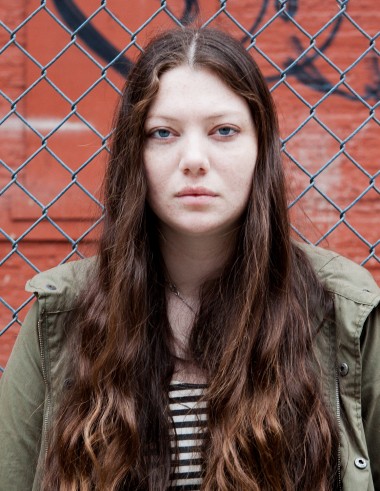
I don’t know what I could do to make me seem gayer. Even last night I was talking to a girl I’ve known for a while. I said something about some girl, and she was like “Oh, are you bisexual?” She jumped to thinking I was straight to thinking I was bisexual. I’m like, “No, I’m pretty fucking gay.”
I could cut off my hair, but that wouldn’t be me. I’m not one of those people who can change my appearance at the drop of the hat. I don’t have piercings, I don’t have tattoos. I guess hair grows back, but I have weird things with my hair. It’s like a security blanket. To me at least, cutting my hair so people know I’m queer would feel like putting on a costume.
I wrote a paper about hair, and when I started writing it, the point was going to be that you can’t judge people’s sexuality based on their hair. But then all the research I found showed you can make assumptions on people based on their hair, and it’s been a really helpful way for the queer community to identify each other. My paper ended up with me realizing that I am the exception. (more…)
Exciting News For 2012!
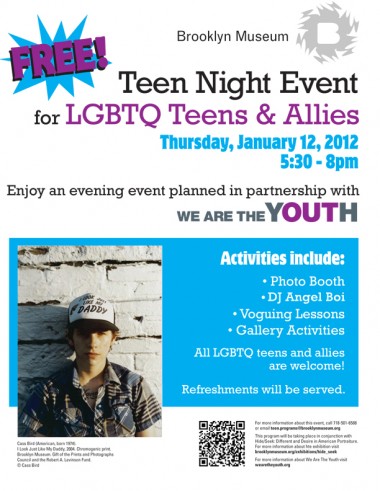
We are thrilled to officially announce our partnership with the Brooklyn Museum in presenting a Teen Night Event in conjunction with the HIDE/SEEK exhibit currently on display! The event will be FREE to all LGBTQ Teens & Allies and will include a rad DJ (to be announced), a photo booth (presented by yours truly), voguing lessons, refreshments, gallery activities and much more! We’ll be posting all updates here as the event draws closer, but in the mean time, GET EXCITED, TELL YOUR FRIENDS AND GO WORK ON YOUR DANCE MOVES.
Thanks to Steph Peller for her (as always) great designs!
Introducing a New Blog Feature!
We Are the Youth is starting a book club! To celebrate the inaugural book “The Vast Fields of Ordinary,” we’ll be interviewing author Nick Burd, and giving away three copies of the Stonewall Book Award winner. Enter the raffle to win a free copy of “The Vast Fields of Ordinary” by tweeting at @wertheyouth with the hash tag #ilovefreebooks or by liking us on Facebook and leaving a comment on our wall by Friday, November 25. We’ll announce the winner the following Monday.
Blogs
- AfterEllen – news, videos and reviews on lesbian and bisexual women
- AfterElton – news, videos and reviews on gay and bisexual men
- AutoStraddle – “news, entertainment, opinion and girl-on-girl culture”
- Change.org – an online destination for social change
- Pam’s House Blend – centers around LGBT issues, rights, religion, and politics
- Queerty – centers on gay issues. “Free of an Agenda. Except That Gay One”
- The Elder Project – an oral histories of GLBTQ elders
- Towleroad – centers on gay issues.
- The Slope – the home/blog for the hilariously charming web-series, The Slope, which follows the lives of a lesbian couple navigating their way through modern-day Park Slope, Brooklyn
- Velvet Park – “Dyke Culture in Bloom”
Helpful Definitions
Aggressive (Ag): A term used to describe a female-bodied and -identified person who prefers presenting as masculine.
Agender (Also Non-gender): Not identifying with any gender, the feeling of having no gender.
Ally: Someone who advocates for and supports members of a community other than their own.
Androgynous: A person appearing neither traditionally masculine nor feminine in dress, appearance, or behavior.
Asexual: A person who is not sexually attracted to any gender.
Assigned Sex/Gender: The sex/gender one is assigned at birth, generally by a medical professional, based on a cursory examination of external genitalia.
Binding: The process of flattening one’s breast tissue in order to create a male-appearing chest.
Bisexual: A person emotionally, physically, and/or sexually attracted to males/men and females/women. This attraction does not have to be equally split between genders and there may be a preference for one gender over others.
Bottom Surgery: Surgery on the genitals designed to create a body in harmony with a person’s preferred gender expression.
Butch: A person who identifies themselves as masculine, whether it be physically, mentally or emotionally. Butch is sometimes used as a derogatory term for lesbians, but it can also be claimed as an affirmative identity label.
Cisgender: Someone who identifies with the gender and sex assigned at birth.
Crossdresser: Someone who wears clothes associated with another gender part of the time.
Drag King: Often female-identified person who dresses in stereotypically masculine drag and personifies stereotypically-male characteristics.
Drag Queen: Often male-identified person who dresses in feminine drag and personifies stereotypically-female characteristics.
Down Low (D/L): A term primarily used in homosexual/queer male communities of color, particularly those of Africana descent, denoting a lack of disclosure of homosexual desire, behavior, or identity.
Female-Bodied: A term used to recognize a person who was assigned a female sex at birth or who has a female body.
Femme: Feminine identified person of any gender/sex.
FTM or F2M (Female-to-Male): Term used to identify a person who was assigned a female gender at birth or is female-bodied, and who identifies as male, lives as a man, or identifies as masculine.
Gender Binary: An individual’s internal sense of being a man or a woman, or something more or different than those binary categories.
Gender-Confirming Surgery: Surgical procedures that change one’s body to conform to a person’s gender identity.
Gender Dysphoria: A term of the psychiatric establishment which refers to a radical incongruence between an individual’s birth sex and their gender identity combined with dissociation from one’s physical body and mental sense of gender. Many in the transgender community find this term offensive or insulting as it often pathologizes transgender individuals due to its association with the Diagnostic and Statistical Manual (DSM) and pathologization of gender non-conforming identities.
Gender Diverse (also Gender Variant): A person who either by nature or by choice does not conform to gender-based expectations of society.
Gender Dysphoria: A term of the psychiatric establishment which refers to a radical incongruence between an individual’s birth sex and their gender identity combined with dissociation from one’s physical body and mental sense of gender. Many in the transgender community find this term offensive or insulting as it often pathologizes transgender individuals due to its association with the Diagnostic and Statistic Manual (DSM) and pathologization of gender non-conforming identities.
Gender Expression: The way in which a person expresses gender identity, including through clothing, behavior, posture, mannerisms, speech patterns, and activities.
Gender Identity: An individual’s internal sense of being male, female, or something else.
Gender Identity Disorder (GID): Series of three diagnosis published in the American Psychological Association’s Diagnostic and Statistical Manual of Mental Disorders (DSM) originally called Transsexualism (1980) referring to gender non-conforming identities such as transgenderism. Gender Identity Disorders in Adolescents and Adults, Gender Identity Disorders in Children, and Transvestic Fetishism (TF).[3] GID is highly controversial due to the negative pathologization and personal limitations it places on access to physical transition resources and medical care.[4]
Gender Non-Conforming: A term often used to refer to the myriad of individuals who may not identify as transgender, but who do not conform to traditional gender norms.
Gender Neutral: Used to denote a unisex or all-gender inclusive space, language, etc. Example: A gender-neutral bathroom is a bathroom open to people of any gender identity and expression.
Gender Neutral Pronouns: See Third Gender Pronouns.
Gender Outlaw: A term popularized by trans activists such as Kate Bornstein and Leslie Feinberg, a gender outlaw refers to an individual who transgresses or violates the “law” of gender (i.e. one who challenges the rigidly enforced gender roles) in a transphobic, heterosexist and patriarchal society.
Gender Role: The behaviors, attitudes, values, beliefs etc. that a cultural group considers appropriate for males and females on the basis of their biological sex.
Genderqueer: A person whose gender identity is neither man nor woman, is between or beyond genders, or is some combination of genders. This identity is usually related to or in reaction to the social construction of gender, gender stereotypes and the gender binary system.
Gender Variant: See Gender Non-Conforming.
Heteronormativity: describes a binary gender system, in which only two sexes are accepted. Adherents of this normative concept maintain that one’s gender identity and one’s gender role ought to be congruent with one’s external genitalia, and that one ought to display a heterosexual sexual preference.
Heterosexism: Prejudice against individuals and groups who display non-heterosexual behaviors or identities, combined with the majority power to impose such a prejudice.
Hormone Therapy: Administration of hormones to affect the development of secondary sex characteristics of a different gender than the gender assigned at birth.
Intersex: A set of medical conditions where one is born with a variation in sex characteristics including chromosomes, gonads, or genitals that do not allow an individual to be distinctly identified as male or female. Such variation may involve genital ambiguity, and combinations of chromosomal genotype and sexual phenotype other than XY-male and XX-female.
Intergender: A person whose gender identity is between genders or a combination of genders.
Male-Bodied: A term used to recognize a person who was assigned a male sex at birth or who has a male body.
Metrosexual: First used in 1994 by British journalist Mark Simpson, who coined the term to refer to an urban, heterosexual male with a strong aesthetic sense who spends a great deal of time and money on his appearance and life style. This term can be perceived as derogatory because it reinforces stereotypes
that all gay men are fashion-conscious and materialistic.
MTF or M2F (Male-to-Female): Term used to identify a person who was assigned a male gender at birth or is male-bodied, and who identifies as female, lives as a woman, or identifies as feminine. Some reject this terminology, arguing that they have always been female where others feel that such language reinforces an either/or gender system.
Natal-female: A person who is born as the female sex.
Natal-male: A person who is born as the male sex.
Natal-sex: The sex of a person at birth (male, female, or intersexed).
Non-gendered: See Agender.
Outing: Involuntary disclosure of one’s sexual orientation, gender identity, or intersex status.
Packing: Wearing a phallic device or prosthesis on the groin and under clothing for any purpose.
Pangender: A person whose gender identity is comprised of many gender expressions.
Pansexual: A person who has a potential emotional, physical, and/or sexual attraction to any person irrespective of sex or gender.
Passing: The ability to present oneself as any gender other than that assigned at birth and be accepted as such. Passing may refer to an individual’s desire or ability to be perceived as a member of a particular group.
Polygender: Identifying as more than one gender or a combination of genders.
Preferred Gender Pronouns (PGPs): In addition to he/she/him/her, there are several non-gender-specific pronouns that some people opt to use to describe themselves. “Hir” is used to replace “her” and “him.” “S/he” or “ze” is used instead of “he” and “she.” Singular-they pronouns (“they,” “them” and “their”) are also used as non-gender-specific pronouns.
Queer: 1) Originally used as a derogatory slur for “gay,” this word has been reclaimed by many people as a statement of empowerment. 2) An umbrella term to refer to those who feel outside the societal norms in regard to gender or sexuality. 3) A political statement, as well as a sexual orientation, which advocates breaking binary thinking and seeing both sexual orientation and gender identity as potentially fluid.
Sex: The physically biological, chromosomal, and anatomical features associated with maleness and femaleness in the human body.
Sexual orientation: The direction of one’s sexual attraction. It is on a continuum and not a set of absolute categories.
Third-Gendered: People who feel they are neither male nor female, but not androgynous either and construct their own gender. The third gender may include (in Western terms) some intersex people, some transgender people, and some androgynous people.
Top Surgery: This term usually refers to surgery for the removal or construction of breasts.
Trans: Variant of transgender and/or transsexual sometimes preferable in gender-non-conforming communities because it focuses on the gender transgression of identity as opposed to focusing on the elements of gender or sex and because it does not separate transgender and transsexual.
Transgender: 1) An umbrella term covering behaviors, expressions and identities that challenge the binary male/female gender system in a given culture. 2) Individuals who change their gender expression without physically or medically changing their body through hormones or surgery. 3) Anyone who transcends the conventional definitions of ‘man’ and ‘woman’ and whose self-identification or expression challenges traditional notions of “male” and “female.”
Transition: A complicated, multi-step process that can take years as some transgender people align their anatomy with their sex identity and/or their gender expression with their gender identity.
Transmasculine: A gender-variant gender expression that has a prominent masculine component.
Transphobia: 1) The fear, hatred, or intolerance of people who identify or are perceived as transgender. 2) Fear and hatred of all those individuals who transgress, violate or blur the dominant gender categories in a given society.
Transsexual: A person whose gender identity is different from their assigned sex at birth who has taken any steps of physical transition so that their physical body is congruent to both their gender identity and the conventional concept of male and female bodies.
Two Spirit: A term for both same-gender-loving and transgender people that emerged from various Native American traditions.
*These definitions seek to help visitors navigate profiles on the site. This is by no means a comprehensive list.
